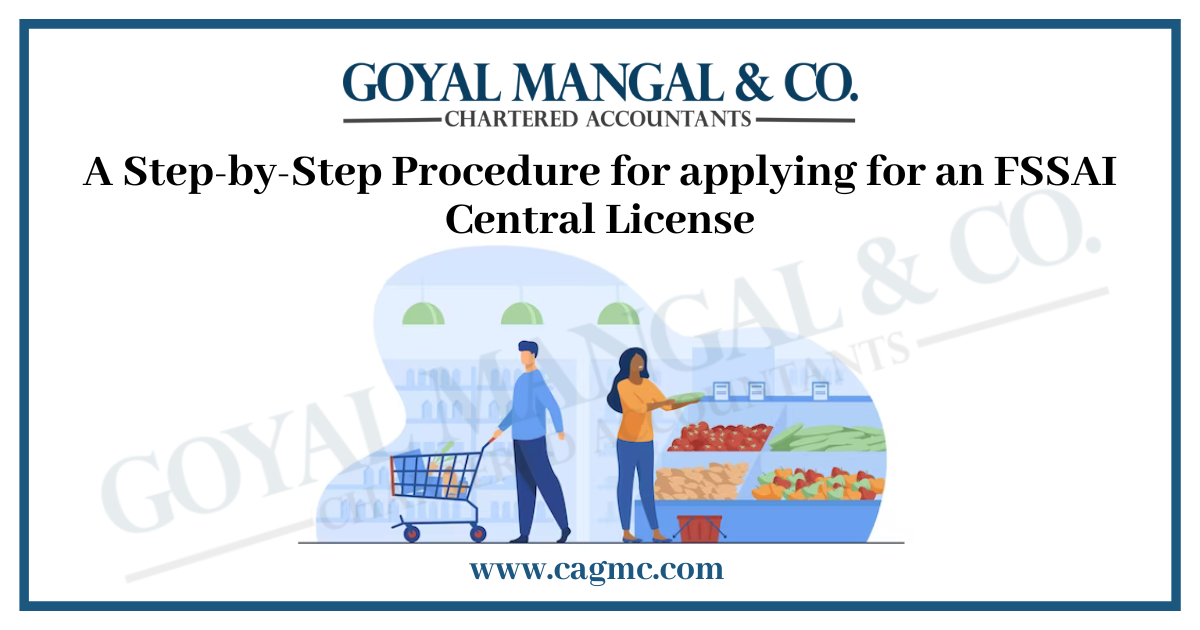
In India, food safety and regulatory standards are upheld by the Food Safety and Standards Authority of India (FSSAI). For certain food businesses operating on a large scale or involves in import-export activities, obtaining an FSSAI Central License is significant. This license not only ensures compliance with food safety regulations but also enhances consumer trust expands market opportunities, and promotes credibility in the sector. If you are planning to apply for an FSSAI Central License, understanding the procedure is essential. This article will offer you a step-by-step procedure for applying for an FSSAI Central License. By following these steps, you can navigate the application process smoothly and ensure your food business operates within the legal framework while prioritizing food safety and quality.
|
Table of Content |
What do you mean by FSSAI License?
The FSSAI license refers to the license issued by the Food Safety and Standards Authority of India (FSSAI), which is the regulatory authority responsible for ensuring food safety and regulating the food industry in India. The FSSAI license is mandatory for all food businesses operating in India, including manufacturers, processors, distributors, retailers, and importers.
The FSSAI license serves as a certification that the food business complies with the food safety standards and regulations set by the FSSAI. It ensures that the food products being produced, handled, and sold meet the necessary quality and safety standards, protecting the health and well-being of consumers.
Eligibility Criteria for Applying for an FSSAI Central License
To apply for an FSSAI Central License, certain eligibility criteria must be met. The FSSAI has specified the following criteria for businesses that need to obtain a Central License:
- Large-scale food businesses: The Central License is mandatory for food businesses with a large-scale operation. This includes businesses with an annual turnover exceeding ₹20 crore.
- Importers: If your food business involves importing food products into India, regardless of the turnover, you are required to obtain a Central License.
- 100% Export-oriented Units: If your food business exclusively focuses on the export of food products and has an annual turnover exceeding ₹20 crores, you need to obtain a Central License.
- Operators in Central Government Agencies: Food businesses operating in agencies of the Central Government, such as airports, seaports, etc., are required to obtain a Central License.
Necessary documents for applying for an FSSAI Central License
When applying for an FSSAI Central License, you need to gather and submit several documents to support your application. The specific documents required may vary slightly based on the nature of your food business and other factors. Here is a list of commonly required documents:
- Completed and signed Form B: This is the application form for the FSSAI Central License. Ensure that all sections are filled out accurately and signed.
- Blueprint/Layout plan of the processing unit: Provide a detailed plan of your processing unit, including dimensions and area allocation. This plan should showcase the layout of various sections, such as raw material storage, processing area, finished product storage, packaging area, etc.
- List of food categories to be manufactured or processed: Specify the food categories your business intends to manufacture or process under the Central License.
- List of equipment and machinery used: Provide a comprehensive list of the equipment and machinery used in your food business, including their technical specifications.
- Photo identification of the applicant: Submit a copy of your photo identification document, such as a PAN card, Aadhaar card, voter ID, or passport.
- Proof of possession of premises: Provide documents that establish your possession of the premises where your food business operates. This could include property papers, rental agreements, or lease agreements.
- Partnership deed or certificate of incorporation/registration: If your business is a partnership firm, submit the partnership deed. For companies, provide the certificate of incorporation or registration.
- NOC from the municipality or local body: In some cases, you may need a No Objection Certificate (NOC) from the local municipality or governing body where your business is located.
- Water analysis report: Submit a chemical and bacteriological analysis report of the water used in your food processing unit.
- Certificate of Food Safety Management System: If your business has implemented a Food Safety Management System, such as ISO 22000 certification, provide the relevant certificate.
- Declaration form: You may be required to submit a declaration form stating that the information provided in the application is accurate and that you will comply with the FSSAI regulations.
A Step-by-step procedure for applying for an FSSAI Central License
The FSSAI is responsible for ensuring food safety and regulating the food industry in India. If you want to apply for an FSSAI license, which is required for certain types of food businesses, you can follow these steps:
- Determine your eligibility: The central license is mandatory for large food businesses and certain types of food activities, such as manufacturers, importers, 100% export-oriented units, and operators in Central government agencies, airports, seaports, etc. Ensure that your business falls under the category that requires a central license.
- Gather the necessary documents that are already mentioned in the above section.
- Fill out the application form: Complete Form B (application form) with accurate information. You can obtain the form from the FSSAI website or the regional office of FSSAI.
- Submit the application: Submit the completed application form along with the necessary documents to the regional office of FSSAI. Ensure that you include all the required documents and that they are properly filled out and signed.
- Application processing: The FSSAI will review your application and the documents submitted. If there are any discrepancies or missing information, they may request additional details. They will also conduct inspections of the premises and assess your food safety management system.
- License issuance: Once your application is processed successfully, and all the requirements are met, the FSSAI will issue the central license. The license will specify the category and validity period.
Benefits of obtaining FSSAI Central License
Obtaining an FSSAI Central License for your food business offers several benefits. Here are some key advantages:
- Legal compliance: The FSSAI Central License ensures that your food business is compliant with the food safety and quality regulations mandated by the government of India. It helps you operate within the legal framework, avoiding penalties, fines, or closure due to non-compliance.
- Consumer trust and credibility: Holding an FSSAI Central License demonstrates your commitment to food safety and quality. It builds trust among consumers, as they perceive your business as one that meets the necessary standards and regulations. This trust can lead to increased customer loyalty and a positive brand image.
- Enhanced market access: The Central License opens doors to wider market opportunities. It allows you to engage in large-scale food production, import-export activities, and supply to major clients, including government agencies, airports, seaports, etc. This expanded market access can contribute to business growth and profitability.
- Global recognition: If your food business involves import or export operations, the FSSAI Central License establishes your compliance with international food safety standards. It facilitates smooth interactions with foreign partners, ensuring a smooth flow of trade and promoting your business in the global marketplace.
- Improved food safety practices: The FSSAI Central License encourages food businesses to implement robust food safety management systems. It sets guidelines for hygiene, sanitation, storage, labelling, packaging, and quality control, leading to better food safety practices within your business operations.
- Regulatory support and guidance: Holding a Central License means that your business is under the supervision and guidance of the FSSAI. You can access support, resources, and guidance from the authority, such as training programs, technical assistance, and updates on regulatory changes. This helps you stay updated with the latest industry standards and best practices.
- Competitive advantage: Having an FSSAI Central License can give you a competitive edge over non-compliant or unlicensed food businesses. It differentiates you from uncertified competitors, especially when participating in tenders or bidding for contracts that require FSSAI compliance.
- Consumer protection: The FSSAI aims to protect consumer health and safety. By adhering to FSSAI regulations, you contribute to ensuring that the food products reaching consumers are safe, of good quality, and properly labelled, thereby safeguarding public health.
Takeaway
Throughout this article, we have walked you through the step-by-step procedure for applying for an FSSAI Central License, emphasizing the importance of eligibility determination, document preparation, and submission. By following the outlined procedure and providing the necessary documents, you can demonstrate your commitment to food safety, gain consumer trust, and access a wider market. The FSSAI Central License not only helps your business meet legal requirements but also sets you apart from competitors, enhances your brand image, and contributes to the overall growth and success of your food business. With the FSSAI Central License in hand, you can confidently operate your food business while prioritizing the health and safety of your consumers.


